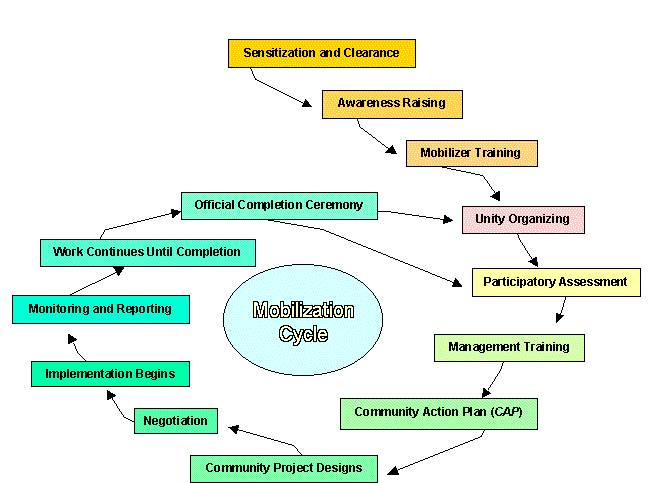Tweet
Tajumaad:
'العربية / al-ʿarabīyah
Bahasa Indonesia
বাংলা / Baṅla
Български език
Català
中文 / Zhōngwén
Deutsch
English
Español
Filipino/Tagalog
Français
Ελληνικά / Elliniká
हिन्दी / hindī
Italiano
日本語 / Nihongo
Kiswahili
한국어 / Hangugeo
Lietuviškai
بهاس ملايو / Bahasa Melayu
Polszczyzna
Português
Română
Русский
सिन्धी / Sindhi
Српски / Srpski
Somali
తెలుగు /Telugu
ไทย / Thai
Tiếng Việt
Türkçe
اردو / Urdu
Other formats:
Other Pages:
Modules
Site Map
Ereyada Furaha
Hadii aad aragto eray u baahan in la falanqeeyo
Utility Documents
Useful Links
CUTUBYADA TABABARKA
by Phil Bartle, PhD
Training modules contain basic texts, model forms, short handouts for workshops, and notes for trainers. Each module has a single topic, with different documents in it for different actors or purposes.
The first five modules contain short handouts to be used in an introductory workshop. Except for trainers' notes, all are included in one document, Mobilisers' Handbook.
Introductory Modules (short handouts):- Is Diyaarinta, Nagoshada Bulsho Wacyigeliye;
- Getting Started, preparing the community for action;
- Organizing the Community, combining action and training;
- Into Action, community movement;
- Sustaining the Intervention, beyond a single mobilizer;
- Principles of Community Empowerment, reasons behind fighting communal poverty;
- Mobilization, skills in moving and organizing a community to act;
- Participatory Appraisal, stimulating the community to assess itself;
- Management Training, training as a method of (re)organizing for effectiveness;
- The Brainstorm, a training process for obtaining group decisions;
- Participatory Management, running an NGO, a project, or a firm;
- Gender, strategies for awareness raising and gender balance;
- Community Project Design, participatory methods to design a community project;
- Community Resources, identify and release sometimes hidden resources;
- Principles of Income Generation, what lies behind a programme to fight poverty;
- Building a Credit Organization, a community organization for channelling credit;
- Micro Enterprise Training, skills needed by small scale business people;
- Measuring the Strengthening of Communities, how to monitor capacity development;
- Monitoring and Evaluation, observing and analysing progress;
- Report Writing, how, why, for whom, to write reports;
- Training Methods, using the material.
- Stories, short anecdotes from the field.
- Managing a Mobilization Programme, issues related to the peculiar characteristics of the process;
- Community Research, social variables of the community, obtaining valuable information to empower a community;
- Water and the Mobilizer, when the community chooses clean drinking water;
- Non Material Development; when the community chooses advocacy, civil society, social work, female genital mutilation, HIV AIDS;
- Functional Literacy, learning how to write and read through unorthodox methods; design a functional, practical, useful and relevant programme;
- Capacity Development, how to strengthen an organization; using the empowerment approach on an NGO, company or agency;
- Enabling Environment, encouraging communities to be more self reliant; the political and administrative situation affects their empowerment;
- From Disaster to Development, transforming charity to empowerment how to convert your programme from relief when the disaster ends.
- Stay Happy and Healthy;
- Beginners' Sociology, some of the science that spawned the empowerment methodology of this site;
- Readings;
- Discussions;
- Perspectives;
- Classical Sociologists;
- Cultural Dimensions;
- Inequality;
- Community;
- Family;
- Socialization and Education;
- Crime and Deviance;
- Religion;
- Change;
- Demography;
- Miscellaneous;
- Research;
- References.
- An Aural Method to Learn an Oral language;
- The CMP Strategy;
- Three Handbooks;
- What is Community?
- Writing Errors;
- Training for Strength;
- ISS Research;
- What is wrong with international aid?;
- Leadership, Identifying and Training Community Leaders
- Working Bibliography;
- Extra Illustrations;
- We Need a Volunteer;
- Utility Documents (including contributor profiles);
- Ghana Income Generation Report;
- Individual Guidance.
––»«––
 |
Complementary Modules : Participatory Appraisal, Community Research, Sociological Research
Complementary Modules: Non Material Development, Functional Literacy, Gender Balance
Complementary Modules: Community Project Design, Project Resource Acquisition
Complementary Modules: Empowerment Principles, Capacity Development, Measuring Strength
Complementary Modules: Participatory Management, Management Training, Managing Mobilization
Complementary Modules: Income Generation, Credit Organization, Micro Enterprise Training
Complementary Modules: Monitoring and Evaluation, Handbook on Monitoring, Report Writing